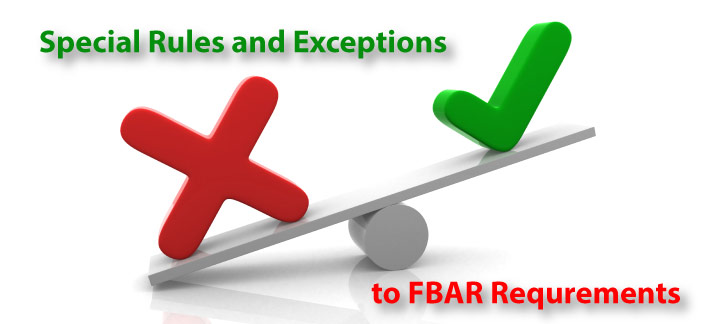Special FBAR Reporting Rules for Certain Types of Foreign Accounts
Under FBAR regulations , special rules may apply to specific types of accounts. In particular, the FBAR reporting requirement may apply to U.S. persons who have “signatory interest” in a foreign financial account, even if that person would not technically have a “financial interest” in the account under the FBAR statute. Finally, the FBAR regulations provide exemptions for certain types of accounts. Under the exemptions, accounts which may appear to fall within FBAR reporting are actually exempted, and U.S. persons associated with those accounts are free of an FBAR reporting obligation.
FBAR Reporting Requirement Applies to Those with Signatory Interest Over Account
Even if a U.S. person does not have “financial interest” in the financial account, as defined by the FBAR regulations, the U.S. person may still be required to file an FBAR with respect to the account if there exists “signatory authority” over it. Only an individual can have signatory authority over an account, as opposed to a corporation or partnership. Signatory authority exists when an individual has “authority . . . (alone or in conjunction with another) to control the disposition of money, funds or other assets held in a financial account by direct communication (whether in writing or otherwise) to the person with whom the financial account is maintained.” This essentially means that the individual has signatory authority, and is required to repot FBAR, if he or she can effect distributions from the account. In contrast, if the individual merely has the ability to direct investments in the account, without the ability to effect distributions, he or she does not have “signatory authority” and does not fall within the scope of FBAR regulations.
Certain Accounts are Exempted from FBAR
Under FBAR regulations, certain types of accounts and U.S. persons are exempt from the reporting requirement. Specifically, a person is not required to file an FBAR report with respect to a foreign financial account which is owned by the U.S. government, an Indian Tribe, a U.S. state, or a political subdivision of a state. This code section also provides an exemption for accounts of an “entity…that exercises governmental authority on behalf of” any of the aforementioned groups. There is also an exemption for accounts of certain “international financial institutions” in which the U.S. government has membership. An account with a U.S. military banking facility is also exempted from filing an FBAR report, even if the branch is located in a foreign country. Finally, a correspondent account that is maintained by a bank and used for bank-to-bank settlements does not fall within the FBAR reporting requirements.
How a Tax Attorney Can Help with FBAR Reporting
Individuals with foreign assets and bank accounts have been under increased scrutiny in recent years. In addition to reporting foreign income, taxpayers must take the important step of filing an FBAR form in order to avoid penalties and fines.
The Tax Lawyer - William D. Hartsock has been successfully helping clients with tax issues related to their foreign assets since the early 1980s. Mr. Hartsock offers free consultations with the full benefit and protections of attorney client privilege to help people clearly understand their situation and options based on the circumstances of their case. To schedule your free consultation simply fill out the contact form found on this page, or call (858) 481-4844.



Comments (0)